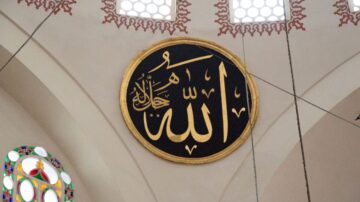In our journey to gain tranquility of the heart, we explored what we need to know when faced with difficult situations. We need to understand that God has told us we will be tested, that these tests are for a reason, and that there will be relief.
When we are worried thinking about the future, we need to work hard but have full trust in God that He will not leave us, and we must always think well of God because that is what we will find.
Yet in certain circumstances we just feel broken. Perhaps it is the death of someone close, perhaps a hurtful word, or perhaps a reason we cannot pinpoint. Yet this feeling of brokenness can be an invitation to be better acquainted with Al-Jabbar.
But isn’t Al-Jabbar one of God’s Names that indicates Majesty and Strength, not Mercy and Beauty?
The root of Al-Jabbar is “ja-ba-ra” and has a wide variety of meanings indicating God’s strength and majesty. One of the basic meanings of this name is the one who compels and restores, and demonstrates God’s majesty and strength over His servants. This is a name for the tyrants and oppressors to be aware of, because their misdeeds will not go unpunished.
Yet God’s name has another dimension: Al-Jabbar is the one who is able to restore and mend what is broken. Some of the great scholars would supplicate “Ya Jaabir kul kaseer” when they were faced with overwhelming difficulty, meaning “Oh You who mends everything that is broken.” The Arabic word for a splint that is used to help an arm heal when it is broken is “jibeera” from the same root “ja-ba-ra”. Thus, when we feel broken, we need to go to the only one who can mend our state–“Al-Jabbar”. Sometimes when we get this broken feeling, Satan tells us not to turn to God because we are being hypocritical by only going to God when we are down. Yet this is untrue– God has named Himself Al-Jabbar and given Himself this attribute; you cannot go to the one whose attribute is mending what is broken, and not be healed by Him.
Prophet Muhammad’s Journey to Al-Ta’if
The example of the Prophet Muhammad (peace be upon him) is a beautiful one. Imagine being 50 years old, having just lost both your wife of twenty-five years and your uncle who took care of you as a child. Imagine walking into a town in order to ask people for their protection, and instead have them throw stones at you until your feet bleed. How would you have felt? How exhausted, both spiritually and physically, would you have been? And yet, the Prophet calls out to God in one of the most beautiful and heartfelt du`a’ (supplication):
“O Allah! To you alone I complain my weakness, my scarcity of resources, and the humiliation I have been subjected to by people. O Most Merciful of those who have mercy! You are the Lord of the weak, and You are My Lord too.
To whom have you entrusted me? To a distant person who receives me with hostility? Or to an enemy to whom you have granted authority over my affair?
But as long as You are not angry with me, I do no care, except that Your favor is a more expansive relief to me. I seek refuge in the light of Your Face by which all darkness is dispelled and every affair of this world and the next is set right, lest Your anger or Your displeasure descend upon me.
Yours is the right to reproach until You are pleased. There is no power and no might except by You.”
Read these words carefully. The du`a’ of the Prophet was not “O Allah, please give me x and y.” It was literally the call of someone broken– complaining to God of his situation and expressing to God how he felt.
What did God give him?
A young boy by the name of Addaas saw the Prophet, came to him with some grapes and kissed his bleeding feet. That is Al-Jabbar. Imagine how the Prophet must have felt after that, the relief he must have felt after the cruelty he was subjected to. And God healed the broken heart of the Prophet in another way – He bestowed upon him the miraculous Night Journey (when the Prophet traveled from Makkah to Jerusalem, and from Jerusalem to the Heavens in one night).
If we think about the journey, it did not accomplish a great victory nor did it help to convince the Quraysh that he was a Prophet. Rather, God honored him after all the hardship he had gone through. Think of the resolve the Prophet must have had in his heart and the tranquility he must have felt after such an experience.
Therefore, we have to always remind ourselves of this blessed name Al-Jabbar; God will mend your broken heart. It may be through a kind word from someone that brightens your day or it may be a talk that you attend. It may even be something greater. But call on God like the Prophet did, recognizing this attribute, and know that He will manifest this name in your life.
God healed the broken heart of the Prophet in another way.
By Jinan Bastaki
References
Al-Jabbar: Mending the Broken Heart
This article first appeared at Suhaibwebb.com. It is republished with slight editorial modifications.

